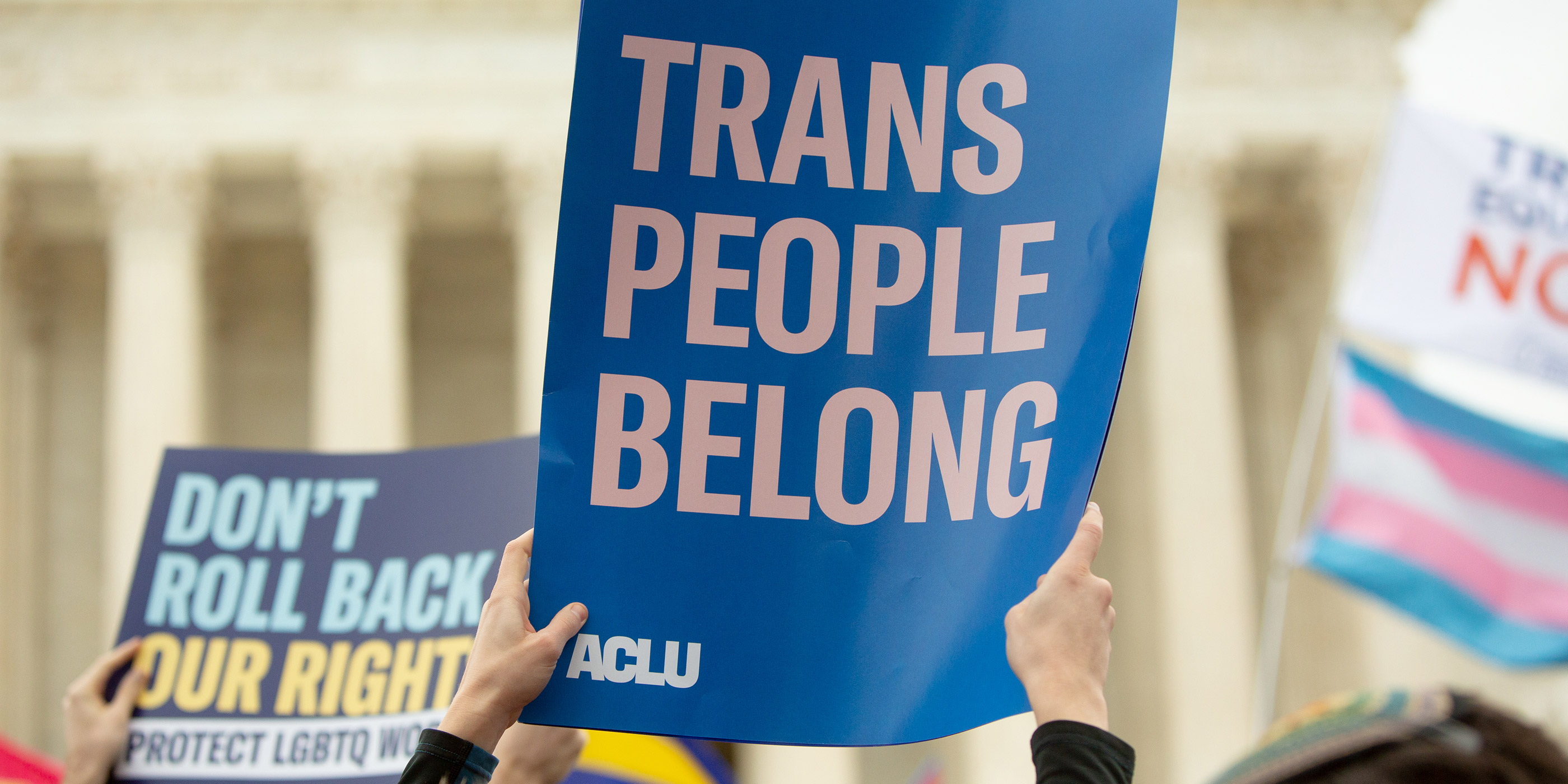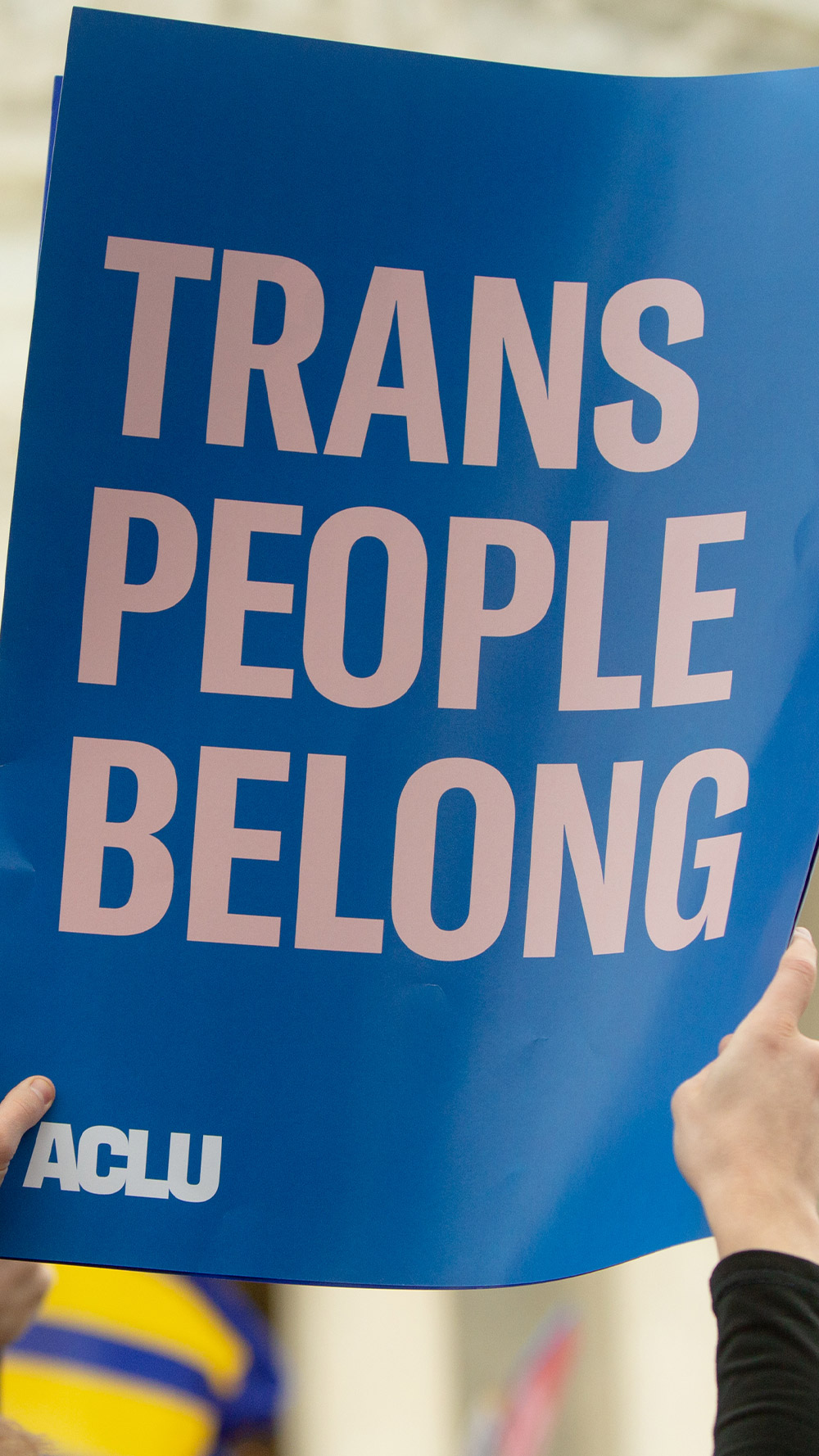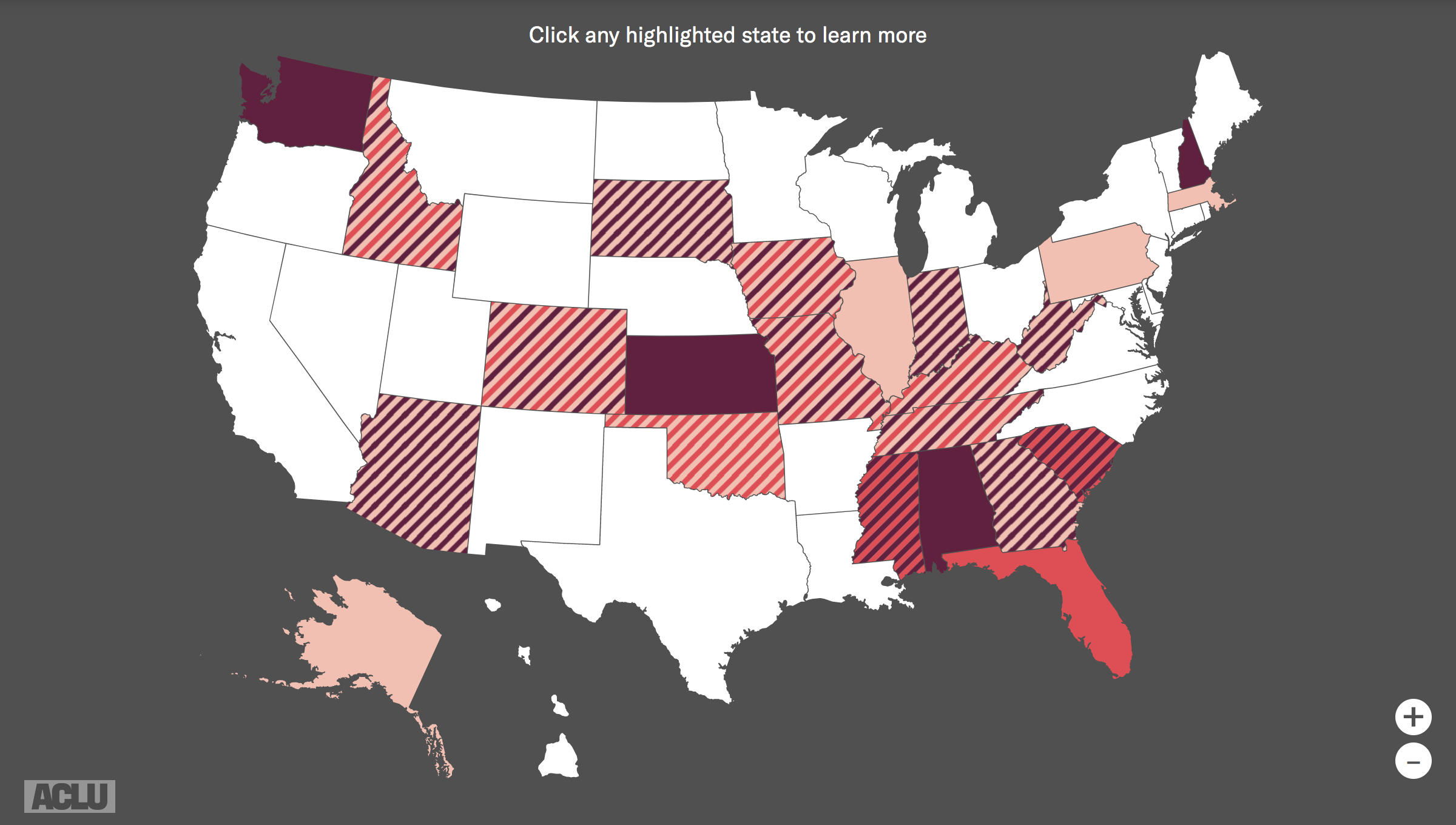Trans People Belong


Across the country, politicians are attacking the fundamental rights of transgender and non-binary people. Trans people of all ages and backgrounds are targets, from kids in schools to incarcerated people to elderly patients in the health care system. But the weight of these attacks disproportionately falls on Black trans women and other trans people of color. Simply put, lawmakers want to stop people from being transgender — and they’re willing to put lives at risk to achieve their aims.
This year is an important one in the fight for trans rights. A record number of anti-trans bills are making their way through state legislatures, and the Supreme Court will issue a monumental decision on the civil rights of trans people in the coming months. Meanwhile, the federal government continues to find more ways to green-light discrimination against trans people.
Trans people have a right to live in safety, to thrive, and to be treated with dignity. A trans patient in need of care should receive it. A trans student should be able to play sports, use the restroom, and participate in activities alongside their peers. Trans people must have safe conditions in prison, jail, immigration detention and other sites of confinement, including shelters, and must be able to utilize facilities and services as their true selves.
Now is the time to raise our voices and remind lawmakers:
TRANS PEOPLE BELONG
...EVERYWHERE.
Health Care
Transgender people should be able to access health care just like everybody else. Yet transition-related health care is explicitly excluded from many public health care programs and private insurance policies, and loopholes in anti-discrimination laws allow health care providers and insurance companies to discriminate against trans people.
In recent years, the Trump administration has put trans people’s health at even greater risk by proposing to gut nondiscrimination protections in the Health Care Rights Law, also known as Section 1557 in the Affordable Care Act, thereby removing vital protections against sex-based discrimination. The administration also wants to give health care providers a license to discriminate based on their religion. For example, a doctor or nurse could refuse to provide care for a transgender person, a same-sex couple, or a person seeking an abortion, saying it violates their religious beliefs. The goal of the administration is clear: to excise transgender people from the basic right to access health care.
The ACLU is fighting back in the courts as tens of thousands of activists are raising their voices in opposition to the proposed changes to the law. We must ensure that trans and non-binary people have meaningful, comprehensive access to care, just like all of us.
Stories
Resources and action
Schools
In 2016, lawmakers fixated on where transgender people go to the bathroom. This year, lawmakers have decided to prioritize barring trans and non-binary youth from accessing the same spaces and rights as their peers. That includes accessing restrooms, athletics, and documentation consistent with their gender identity.
Secretary of Education Betsy DeVos has rescinded key components of Title IX that allowed transgender students to use restrooms consistent with their gender identity. DeVos has also announced that the Department of Education will no longer investigate any complaints filed by transgender students who have been banned from restrooms that match their gender identity. At the same time, states across the country are proposing bans on restroom use, harming trans students.
Through various litigation and advocacy initiatives, the ACLU and partners are fighting back to ensure schools are a safe, inclusive space for transgender and non-binary students.
Stories
Resources and action
Sports
Transgender people have the right to participate in sports consistent with who they are, just like anyone. Denying this right is pure discrimination.
However, states and schools across the country are trying to marginalize trans athletes by banning them from participating in sports like any other athlete. These measures would exclude transgender people from enjoying the benefits of sports on equal terms with their cisgender peers. Not only do these bills discriminate against trans youth in ways that compromise their health, social and emotional development, they also raise a host of privacy concerns.
The marginalization of trans student-athletes is rooted in the same kind of gender discrimination and stereotyping that has held back cisgender women athletes. Transgender girls are often told that they are not girls (and conversely transgender boys are told they are not really boys) based on inaccurate stereotypes about biology, athleticism, and gender. As a result, transgender athletes — particularly Black transgender women — face systemic barriers to participation in athletics and all aspects of public life. This exclusion contributes to the high rates of homelessness, suicidality, and violence that Black trans women and girls face.
Litigation
Stories
Resources and action
The Military
For decades, transgender men and women have been barred from openly serving in the military, despite the fact that recent studies show that about one-fifth of all transgender adults are veterans, making transgender people approximately twice as likely as others to serve in the military.
In 2015, the Pentagon announced the military will work on a policy allowing transgender soldiers to serve openly — but those plans came to a halt when President Trump entered office and promptly signed an executive order banning transgender people from military service.
Though the ACLU, partners, and fellow advocates fought back, the trans military ban still stands. Current U.S. Department of Defense regulations bar transgender persons from military service. Requiring these brave Americans to continue to serve in silence is a profound injustice.
Stories
Workplaces
Sexual orientation and gender identity have nothing to do with how well a person can do their job. Yet transgender workers are often rejected by employers, denied compensation and benefits, or even fired because of who they love or who they are. Nearly one in three transgender people has experienced discrimination in the workplace.
For the past two decades, anti-discrimination laws have protected trans people — and all LGBTQ people — from certain forms of discrimination in the workplace. But the Trump administration is trying to strip away these hard-fought rights. In 2019, the Department of Labor proposed a rule that would allow government-contracted employers to discriminate against trans employees.
Trans rights are at stake in the courts, too. This year, the Supreme Court will decide three cases in which the Trump administration is urging the court to rule that it’s legal to fire workers for being LGBTQ. These cases will affect more people than the 2015 ruling on marriage equality, and they potentially implicate a broader range of contexts in which LGBTQ people may face harm if the court green-lights discrimination.
Through advocacy and litigation, the ACLU is fighting for clear and explicit laws that protect trans people from discrimination on the job. All LGBTQ people are entitled to fair consideration based on their job qualifications alone, just like everyone else.
Stories
Resources and action
Trans People Belong Everywhere
Trans people belong in health care systems, in schools, in the military, in workplaces — everywhere. Trans people have the same civil rights and liberties as anybody else in this country.
The ACLU is fighting for transgender rights in the courts and in legislatures at both the state and federal level. Join our fight by telling Congress to pass the Equality Act and by looking up anti-trans legislation in your state.
Further action and resources
- Know Your Rights: LGBTQ Rights
- Transgender people and ID documentation
- For more information, visit the , , and .


